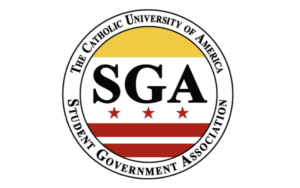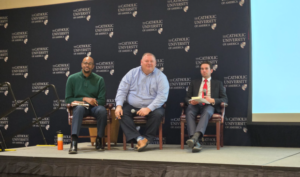Students and Faculty Gather to Share Experiences with Diversity at Accessibility Panel
By Thomas Holmes
Catholic University’s Student Government Association (SGA) and the Diversity and Inclusion Initiative hosted the Accessibility Panel in order to raise awareness for the diverse groups on campus and to begin a conversation about inclusivity. The event was held in Caldwell Auditorium on April 16.
Four panelists gave their personal accounts about experiencing diversity on campus and how they felt that the members of the university should respond to it.
The first panelist gave an account of the ways that having a learning disability can pose a challenge to students because their disability is not as apparent as others. The student also explained that dealing with Disability Support Services can be an uncomfortable experience because many students and faculty can be insensitive about certain accommodations.
Ally Kilgore, a sophomore philosophy major, spoke about her experience at Catholic University with the disability Multiple Pterygium Syndrome, a rare disease that affects joint development. Ally claimed that Catholic University was the least accessible campus that she toured, and that still attended the university regardless. Ally noted that many residence halls on campus were inaccessible for her because of her disability.
“I don’t want people to hurt themselves to have to sympathize with the disability community,” said Kilgore. “That is not the perspective people take for other civil rights issues. No one thinks about race or gender inequality and says ‘I would sympathize with those things, but I’m not a minority.’ You do not need to be a minority to have a nuanced and sympathetic understanding of what you can do to be a better ally.”
Kilgore’s statements about sympathy moved the audience made up of people who were there to gain a better understanding of how they could be inclusive to diverse groups on campus.
The next person to speak was Benjamin Shields, a junior music major who also studies library and information sciences. Benjamin wrote a research paper about accessibility in online library systems for his Organization of Information course. Shields presented his research on campus which gave him a better understanding of how to accommodate people with different barriers, whether they are physical, cognitive, or psychological. These barriers limit people’s ability to interact with online resources like they are designed to do. Shields talked about how people with impaired vision or impaired hearing are not able to use certain websites, including the university’s website.
Shields’ research shows the ways in which certain disabilities can affect people’s lives in so many ways that most people would never consider. His research also shows how a simple change in perspective can help influence the way we treat people who have disabilities.
The last presenter was Philip Magalong, the director of Disability Support Services. Magalong began by stating how far the university has come in regards to the treatment and inclusion of people with disabilities.
“When I first took the job, people were still referred to as handicapped,” said Magalong. “That terms comes from a Charles Dickens novel to refer to beggars with their caps in hand.”
Magalong talked extensively about how different ways Catholic University is continuing to strive for better inclusivity for minorities and people with disabilities. The Diversity and Inclusion Initiative and SGA hoped to start an informed dialogue about diversity by highlighting certain student’s experiences.








